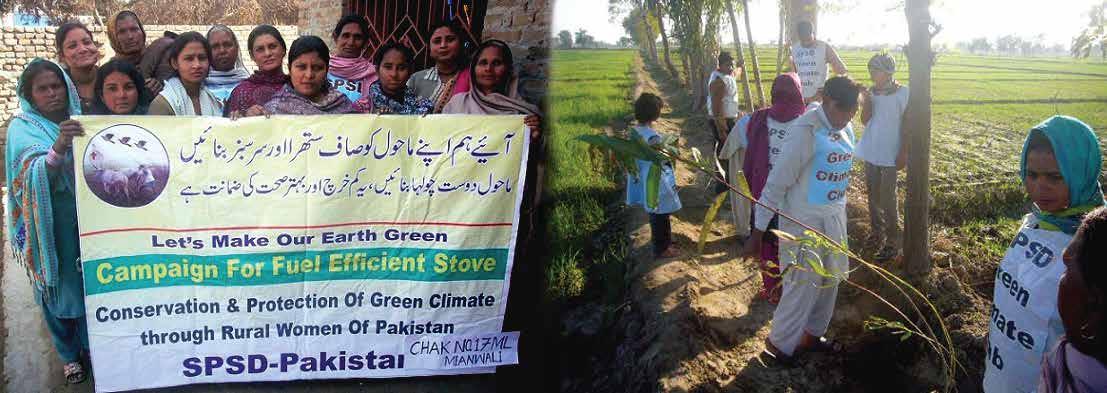
12 minute read
Time’s Call To Open Our Eyes And Ears To Climate Justice An Ecumenical Response
An Ecumenical Response Time’s call to open our eyes and ears to Climate Justice
by Rev Rufus Kamran, Society for Peace and Sustainable Development (SPSD)
Rev Rufus Kamran is a key theologian and thinker on Climate Justice in Pakistan. He is a bold Climate Justice activist and works for Society for Peace and Sustainable Development (SPSD)-Pakistan as Executive Director. SPSD-Pakistan is a Christian faith based Ecumenical organisation, having a deep concern over the issues of Climate Justice and Economy of life. SPSD-Pakistan’s other focus areas are Rights of Women With Disabilities (WWDs); Gender Based Violence (Early Girl Child Marriages); Sustainable Agriculture and Family Farming; Peace Building and Interfaith harmony Rule of law and Human Rights; Food Security and Poverty alleviation Rev Kamran has done his Masters in Cultural Anthropology and as well as bachelors in Theology. Recently, he has participated in World Council of Churches (WCC) ECO School Asia on water, Food Security and Climate Justice held in Thailand from November 4-17, 2019 as a resource person.
he Bible is clear that God wants us to work for climate justice. God longs for harmony in the whole of Creation, not just in the human family. The Society for Peace and Sustainable Development (SPSD)-Pakistan believes that we are called to preserve God’s Creation.
In the Gospel of Mark 1:14-15, Jesus is coming into Galilee, preaching the gospel of God and saying: “The time is fulfilled, and the kingdom of God is at hand, repent and believe in the gospel."
The Greek word Mark uses for” time” is carefully chosen. It is “Kairos”. It means not clock time but a critical time of special significance, a time of danger or when an opportunity has to be grasped, a time to be awake and alert and prepared to act.
This sense of urgency and the need to open our eyes and ears to the significance of what is happening runs through the gospel, for instance Luke records Jesus approaching Jerusalem and, as he “saw the city he wept over it, saying, “Would that even today you knew the things that make for peace! But now they are hiding from your eyes. For the days shall come upon you, when your enemies will cast up a bank about you and surround you… and they will not leave one stone upon another… because you did not know the time of your visitation." (Luke 19:41–44). The word for “time" is again, the same word “Kairos".
INSiGHT | February 2020 Participants at the SPSD Tree Planting Campaign in District Mianwali.
witness against you this day, that I have set before your life and death, blessing and curse: therefore, choose life, which you and your descendants may live." (Deuteronomy 30:19)
Through Moses, through the prophets, through Christ Himself there is this constant theme – the call to open our eyes and ears. To see and hear what God is telling us. Wake up and act.
We are at a Kairos time for this precious planet. We, humankind, have been given a clear responsibility to care for God's earth. At the end of the story of the creation in Genesis chapter 1, it says: “and God saw everything he had made, and behold, it was very good.” In the following chapter we read: “the Lord God took the man and put him in the garden of Eden to till it and keep it." We have a duty to care for God’s earth.
SPSD-Pakistan is embarking on a journey for change, responding to God’s call for us to love our neighbours as we love ourselves and to take great care of creation. It is working to foster theological, advocacy-oriented and lifestyle-changing reflection and action in collaboration with different churches at grassroot level. In working for climate justice, SPSD-Pakistan is applying both mitigation and adoptive strategies in flood-affected and disaster-prone areas through rural communities and especially with the support of rural women in Pakistan. In addition, it does its best to model ecological awareness and its contributing insights from spirituality and values informed by sacred texts, holistic and integral world views.
The lives and livelihoods of Pakistani rural women are threatened by climate change events, environmental degradation, militarisation, ethnic and religious discrimination and economic policies that make small scale subsistence farming unsustainable. They are often excluded from decision-making and have limited access to and control over resources, which impedes their rights. They are also affected more severely and are more at risk from natural disasters and extreme weather events, including during post-disaster response efforts.
SPSD works with about 5,000 very small-scale women farmers who primarily belong to the socially excluded groups. These women suffer multiple forms of marginalisation. In the urban-rural divide, they are marginalised. Being poor, in the economic divide they are marginalised. Owing to their belonging to minority sects in the social divide, they are marginalised. And as women they face severe marginalisation in the gender divide.
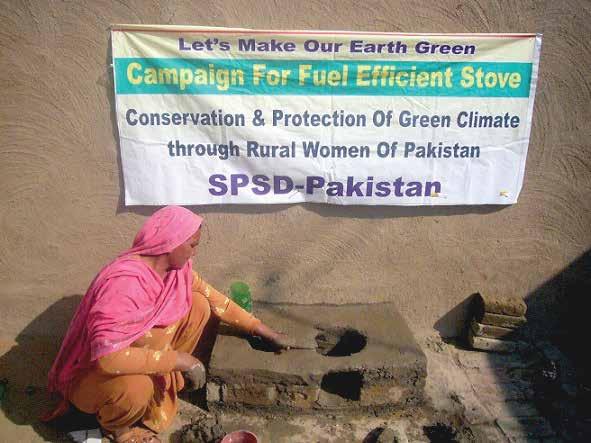
The absence of female voices from decisions about environmental management, climate change adaptation and mitigation come with long-term consequences for the wellbeing of women, their families and the sustainability of their communities. It is therefore important to articulate rural and indigenous women’s critical role and capacity in the nurturing of a sustainable ecological system. In Pakistan, where the majority’s livelihoods of rural people are intertwined with farming pursuits, the challenges in agriculture seriously threaten livelihoods and push them to face more unpredictable situations. The effect of rising temperatures and more unpredictable rainfall patterns are going to be serious tests. The poor and subsistence farmers are struggling hard in order to survive in farming and sustain their living. Both adaptation and mitigation strategies are essential to curtail the negative impacts of the continuously rising threats of climate change. Where mitigation is concerned with limiting and reducing the quantity of greenhouse gas emission, adaptation intends to reduce the vulnerability of human and natural systems to climate threats.
SPSD-Pakistan held meetings and discussions with local communities, to develop and test options and strategies to address the different climate change issues. During the process nearly 1,300 households in all five districts of three clusters were consulted. Transect walks and surveys were conducted with the help of villagers to identify common solutions.
Following this, the local people launched a tree planting campaign, where they were fully involved in the planting activity. The common land was cleared by uprooting bushes and unwanted thorny plants. Pits were dug and farmyard manure was mixed in every pit before planting to make it conducive for plant growth. The men participated in land preparation and pit digging whereas the women were involved in weeding, irrigation and plantation work. The community took responsibility of watch and ward (keeping vigil over) the newly tree planting activity on rotation basis. The Village Committees were mobilised to have more and more trees on their barren and communal land. This
process has made them able to get the benefit of many ecosystem services. Due to this activity of the village community, the grass seeds have begun to germinate, birds began to return and new trees began to establish themselves. Beside this, the soil has improved and many more varieties of grasses have come back. The habit of planting trees is going successfully.
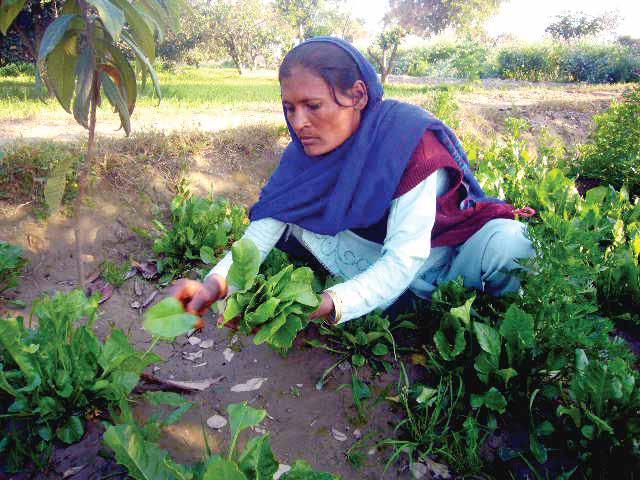
Thousands of people are living below the poverty line in disaster prone areas of South Punjab, Pakistan. These include indigenous communities, asset-less, poor women heading their homes, minorities and disabled persons.
SPSD-Pakistan mobilised vulnerable rural communities to come out of poverty by organising themselves and regenerating the ecosystems they live in. SPSD believes that for boosting sustainable development, the first step is to have an institutional development at grass root level such as to establish farmer’s organisations are necessary. Enabling poor people to overcome poverty, means strengthening their capacity to access resources, services and as well as markets. SPSD also believes that development cannot be sustainable without involvement of the local community in all phases, including planning and execution. As a result, SPSD has formed 140 village committees and Self-Help Groups in 5 districts of South Punjab.
In addition, SPSD-Pakistan has established 40 Village Libraries in five districts of South Punjab, Pakistan. It believes that information is a least expensive input for rural development. Knowledge and information are basic ingredients of advocacy to protect Green Climate and are essential for facilitating rural development and bringing about social and economic change. SPSD also believes that Information is an important tool used in the realisation of any objective or goal set by individuals. It remains the lifeblood of any individual or organisation.
SPSD-Pakistan introduced fuel-efficient stove technology to the rural people, which means that a stove does not emit smoke in an indoor environment due to chimney mechanism and it consumes fire wood efficiently. The fuel-efficient campaign aims to protect families from smoke and fire injury, especially since many women are cooks. The efficient use of firewood means less wood consumed as compared to traditional stoves for cooking and heating. Traditionally, wood was used abundantly for fuel purpose, but now most of the target women are using less wood through fuel efficient stoves.
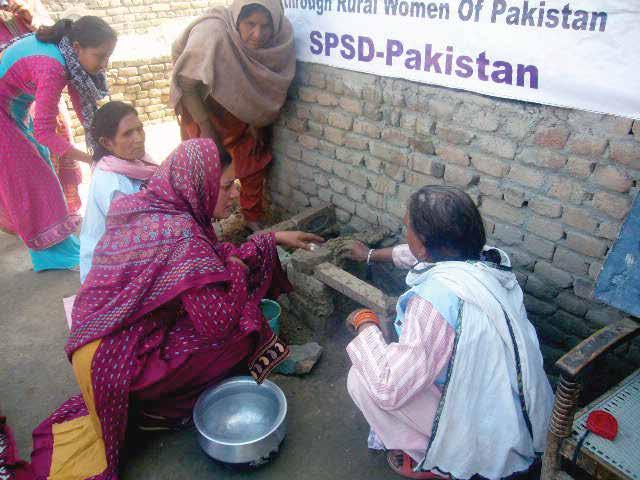
This alleviates a shortage of fuel for cooking - one of the many problems faced by people in the rural areas. Gathering fuel is generally women’s work but is fraught with dangers; they gamble with the risk of rape and life-threatening attacks during their search for much needed firewood, in order to feed their families. In certain areas, local sources of firewood have been completely depleted, leading women to travel further and further or to dig up tree roots, eliminating any chance of the trees growing again.
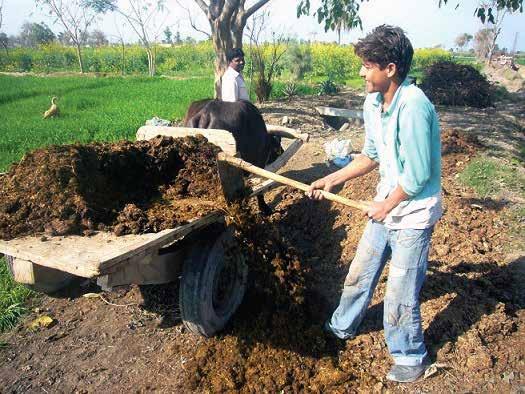
Another area of SPSD’s work is helping rural communities to become more self-sufficient through ecological farming and increased on farm diversity for both their immediate food needs as well as for increased income generation. Sheep and goat rearing play an important role as supplementary source of income for the landless and resource poor farmers. Considering this, rearing a female goat was promoted as an enterprise. Landless marginal farmers and poor women-headed families were selected. The capital required for procuring the goat was produced by the small loan revolving scheme initiated by SPSD-Pakistan.
Besides this, SPSD encourages rural farmers to grow guava and Jumbos in their kitchen gardens and as well as in the empty and useless land. After two years, the trees start producing fruit for the farmers. It increases their income and as well provides a cheap source of energy, proteins, essential amino, fatty acids and substantial amounts of potassium, phosphorus, calcium and magnesium. It also generates the revenues to meet the daily expenditures of the household. SPSD integrates and manages these two high value trees in the farming system of the rural community. As a result, income, nutrition and health have all improved for families involved with the project. At the same time, local biodiversity is being preserved.
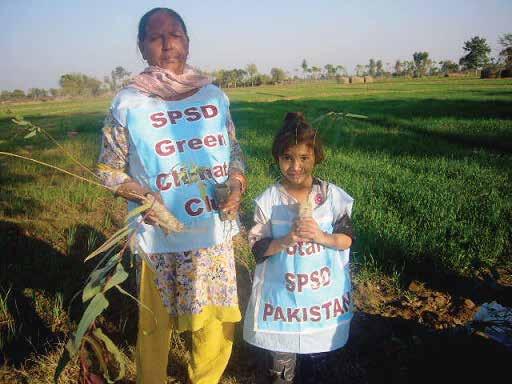
Moreover, roots from the trees are helping to stabilise the soil, reducing the risk of floods, while the leaves and fruit provide a natural fertiliser. SPSD-Pakistan encourages the farmers to adopt soil conservation and agro forestry practices. Changing the behaviour of farmers has resulted in a massive change in the ecology of the area.
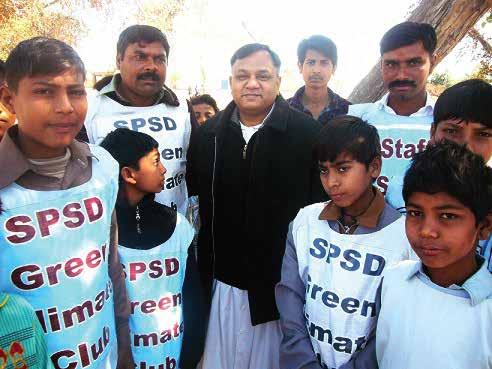
Similarly, SPSD has started Farmer Field Schools (FFS) in 2 districts of South Punjab to boost sustainable agriculture development and resilience. This approach does not require complex advisory structures but focuses on the knowledge of each farmer. An FFS uses a demonstration field that is farmed collectively by up to 20 farmers. The farmers share their knowledge and skills, testing innovative cultivation methods and organic pest control. FFS approach emphasises environmental sustainability. Regional seed and natural fertilisers are used. Safeguarding the biodiversity that makes traditional cultivars relatively resilient to bad weather and pests.
Furthermore, indigenous and local food funfair and get together is held annually under the SPSD Green School Project, to pique the interest of children in indigenous food and its preparation at local level. The group of children gets together and prepares some indigenous food of their own choice and eats together. Each group discusses and announces their selected food item so that no other group cooks the same food. The activity is a tool for reinforcing the strong and vibrant traditional knowledge systems which reverse nature and its relationship with the farming communities. Educational games are the most important part of Green School project, where children make toys and pots from Mud. The basic objective of this game is to let the children be familiar with, and interested in nature and its origin. The drawing activity is also included in this project. The children are asked to make a drawing on objects such as birds, water, sky, trees, animals, human body, vehicles and occupations. They become interested in drawing competitions and learn about nature. In planting season, each student is given two saplings of their choice from SPSD-Pakistan free of charge to plant in their homes. The children like this activity very much and they look after these saplings carefully and regularly. With the passage of time, they develop the sense of ownership of these plants and started lobbying for planting of more trees. Cultivating the interest of the school children in tree planting indirectly contributes in conservation of Green Climate.
Participatory approaches and teamwork are fundamental in implementing sustainable changes at any place. Community organisations and strong linkages among individuals and institutions working together as equal partners can help to bring out innovation and progress. Local knowledge needs to be integrated with modern science.
SPSD believes that strengthening of networking and convergence of the eco-justice movements with the involvement and leadership of churches, faith-based organisations and theological institutions can bring positive change for Climate Justice. SPSD also believes that churches can be impactful models for living together in harmony with creation, as a strong and radiant sign of living the teachings of Christ on the fullness of life, in solidarity with people of other faiths and all people of good will.








